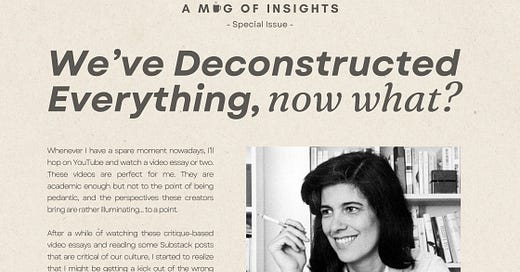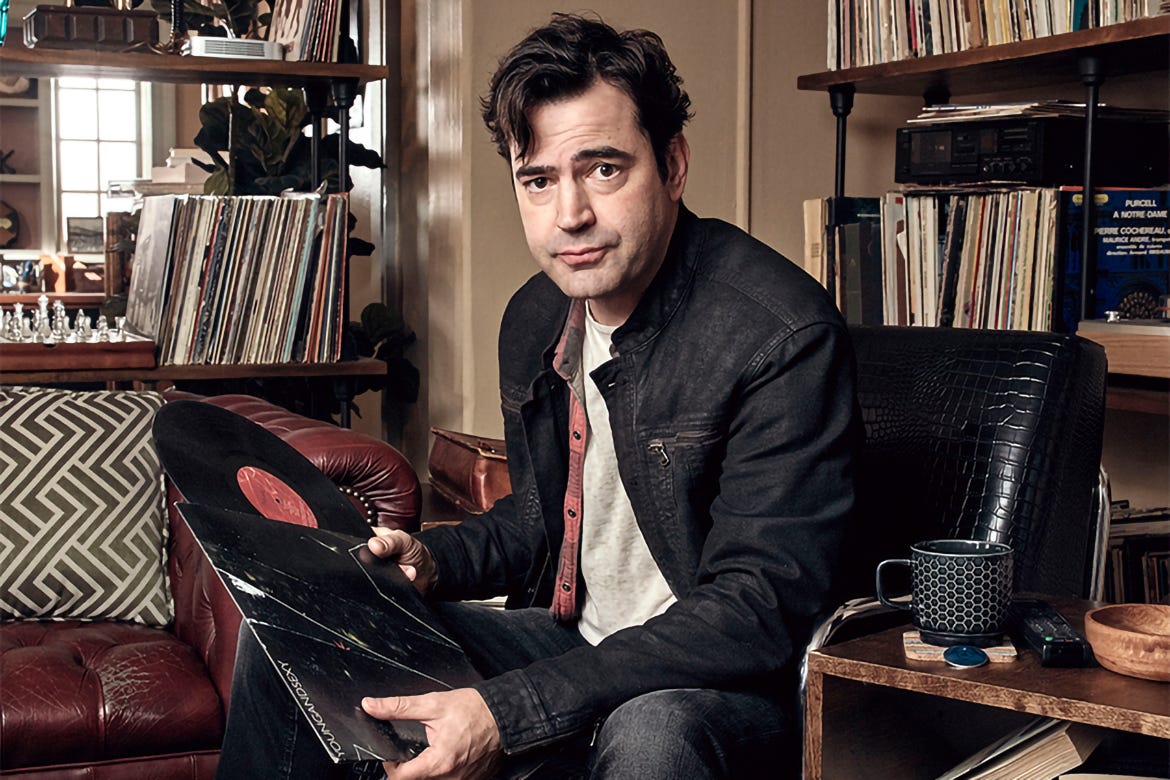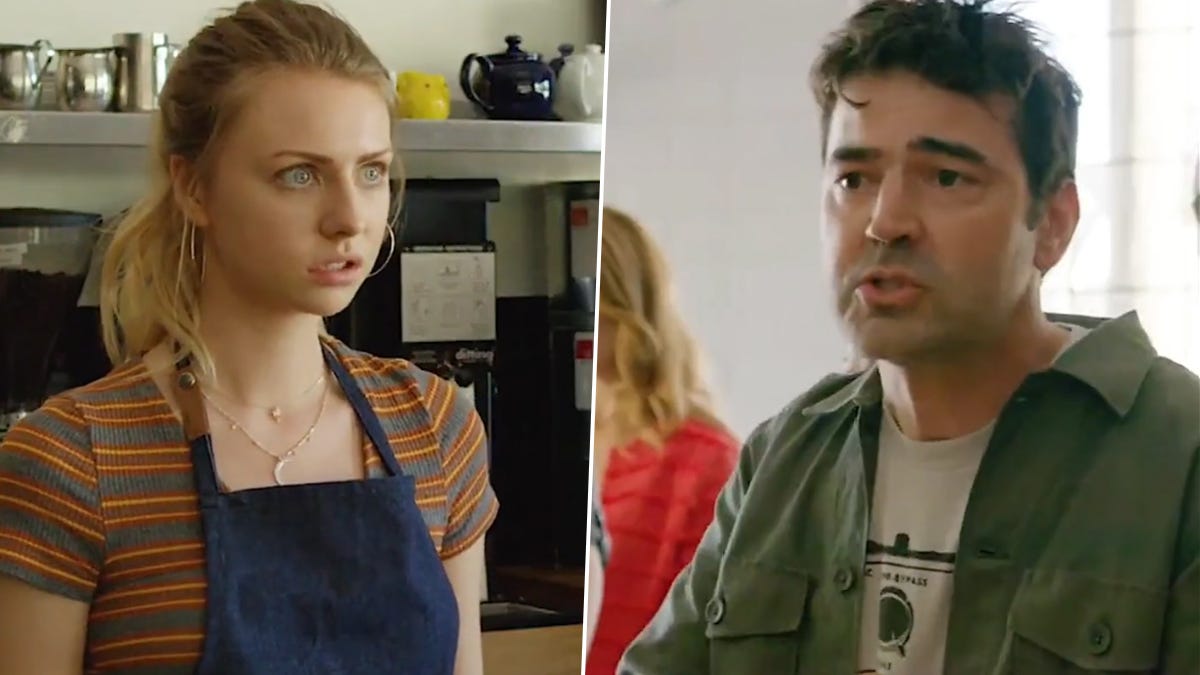We've Deconstructed Everything, Now What?
Video Essays, Cynicism and the Uses And Abuses of Critique
This is a special extended issue of the newsletter for paid subscribers. Paid members will get access to the full archive and all of my extended essays with further reading lists. And on average, subscribers will get 50% more posts from our regularly scheduled program. This will give me more time (alongside grad school research) to produce high-quality posts consistently. Thank you for your contribution!
I’ll usually hop on YouTube and watch a video essay or two whenever I have a spare moment. These videos are perfect for me. They are academic enough but not to the point of being pedantic, and the perspectives these creators bring are rather illuminating… to a point.
After watching some of these critique-based video essays, I started to realise that I might be getting a kick out of the wrong thing. What started as a kind of intellectual curiosity slowly turned into a hunt for the “gotcha” moments whenever a video essayist makes a provocative point.
It made me feel like a smartass. After all, I’m acquainted with the statistics, arguments and figures via video essays and my research, right? I can spot all the hidden forces and malicious intentions in this screwed-up world we are in. But after a while of being in that world of critique, my way of viewing the world started to change.
I can’t watch a film without picking it apart…
I can’t read a book without questioning its integrity…
And I can’t take anything at face value.
What started as a good-faith engagement turned into a snarky and aloof view of everything. The hidden fear is that if I start enjoying what everyone else is enjoying, I’ll lose my status as a critical thinker, right? Except in this case, after assessing the situation, I’ve concluded that critical thinking is a tool while being negative is a choice.
WTF Is the point of critics?
Let’s return to this idea of the critic for a second. Luckily, someone has already posed the sacred question for us:
“What’s the point of critics?”
Asked a young girl in the 8th episode of Loudermilk, a show about an alcoholic rock music critic trying to get sober. This three-seasoned TV show is a tragi-comedy par excellence as each episode portrays the uses and abuses of being a critic.
In Merve Emre’s words, the image of a critic is that of “a contemptible creature: a tyrant, a pedant, a crackpot” and above all, “a very ungentle Reader”. The main character of the show Sam Loudermilk is all of the above, and for him, the point of being a critic is that
“In the pure diarrhea that is pop culture”, he said, “you need somebody who’s gonna be able to find and curate the hidden gems. That’s my job… I gotta figure out and understand what that artist is trying to do and then inform others.”
Loudermilk demonstrates a key character trait of critique: an oppositional tendency against “the pure diarrhea that is pop culture”. He had to estrange himself from everyday tastes and popular opinions to reach something more profound. In Rita Felski’s words in The Limits of Critique, Loudermilk is essentially assuming an “Archimedean standpoint above the blindness of society” while he “condemns the object of his attention”. And when he issues his criticisms, he is enlightening the masses of…
“Your opinions?” The girl said.
Woah! That can’t be it…
Instinctively, we don’t like to think that critique is merely an opinion. “You don’t understand”, I would say when I’m in an especially critical mood, “my critique is informed by my in-depth research and observations that only my trained eyes could detect!”
Except… If we think about it, critique essentially exists in the category of opinions. While these in-depth analyses might carry more gravitas and are more persuasive, they are not Archimedean points. The critics might sound smarter by assuming an oppositional and negative stand, but they are still on the ground with the rest of everyone, trying to figure life out. In a sense, a critic cannot detach himself from the context of his criticisms.
The Three Ingredients of Critique
According to Rita Felski’s The Limits of Critique, three distinct characteristics give critique a special snarky tone, and they are as follows:
1: Critique is secondary:
Each piece of criticism has to be a response to a phenomenon that isn’t created by the critic. Hence, critique always depends on something else.
2: Critique is negative:
Negative here doesn’t have to mean “emotionally negative” but describes the act of negating something. In Robert Koch’s words, critique must “never formulate positive statements: it is always ‘negative’ about its object. In other words, it’s learning to distrust anything that seems too obvious because there has to be a sinister truth behind all delusions.
3: Critique is intellectual
To sound legit, the critic has to wield all the tools from philosophy, history and literary theory to justify their points. And the basic assumption is that normal people and everyday interactions do not carry the seriousness of critique backed up by erudition.
When these three elements work in tandem, it creates a tone of detached and austere writing, creating the illusion that the critic is above it all. What’s more fascinating is that any opinion can be dressed up with the language of critique and achieve a transcendent status. But at the end of the day, if we strip everything down enough, a critique cannot assume the status of the final word because it’s a collection of interpretations dressed up in rhetorical devices and moods, elevating the critic above common opinions.
Some clarifications before we move on. Notice that I did not say there are no standards for evaluating art and culture. Some critics with extensive experience in a field tend to produce more informed opinions that a layman like me can benefit from. For example, I am a huge fan of
’s work because though he gives expert recommendations in music and literature, his work remains light and positive. He is not afraid of leaning into his pure love for jazz and literature. I get the sense that Ted is aware of the role of good faith engagement before he critiques and sets standards.However, I am weary of the extremes of critique or this urge to deconstruct for the sake of deconstructing. I can’t deny that there is an inherent pleasure in taking things apart, but if these tools take total possession of us, this aloof attitude will soon poison how we see everything.
When Critique Takes A Sour Turn
Let’s come back to Loudermilk. If you watch any episode of the show, you’ll quickly get the sense that this guy has allowed his identity as a rock critic to take over his life. He yelled at a lady at a café for holding up the line with her “corporate clown car” and dug into a barista for vocal frying. He’s not informing people of a better standard nor is he educating anyone about rock music. He’s just an asshole pretending that he has a better idea of how to live.
I’d call this headspace a kind of negative sophistry and this is what happens when we lean too deeply into critique. What started as the pleasures of critical thinking and intellectual illuminations quickly morph into a circle jerk that detaches us from what we used to enjoy. We become afraid of getting caught liking something too much to the point of being uncritical.
Slowly but surely, this attitude starts to resemble paranoia. In a seminal paper: “Paranoid and Reparative Reading”, Eve Sedgwick argued that critique suffers from a self-fulfilling prophecy if it goes to extremes:
“Because there must be no bad surprises, and because learning of the possibility of a bad surprise would itself constitute a bad surprise, paranoia requires that bad news be always already known (Sedgwick in Touching Feelings, p.164)."
In the extremes of critique, sometimes we’ve already made up our minds before seeking justifications to back up our views. After all, as all-seeing critics we should be able to anticipate everything and claim the final word, right? Except, in this case, critiques from this place aren’t good-faith engagements. They’re deconstructions for the sake of deconstruction.
So… Are we all doomed as critics then? Is there ever a need to practice critique anymore?
Moving Beyond Cynicism: The Case for Hope
I think there is a middle ground between critique and loving something without critical thinking, but it seems to be the case that we’ve edged too far into critique. And if we still want to practice critical thinking for the right reasons, we’ll have to introduce love and idealism back into cultural criticism.
I stumbled upon this paper when I was researching for my honour’s year titled: “Hope for Critique?” by Christopher Castiglia and it completely changed how I looked at the role of a critic.
Keep reading with a 7-day free trial
Subscribe to A Mug of Insights to keep reading this post and get 7 days of free access to the full post archives.







